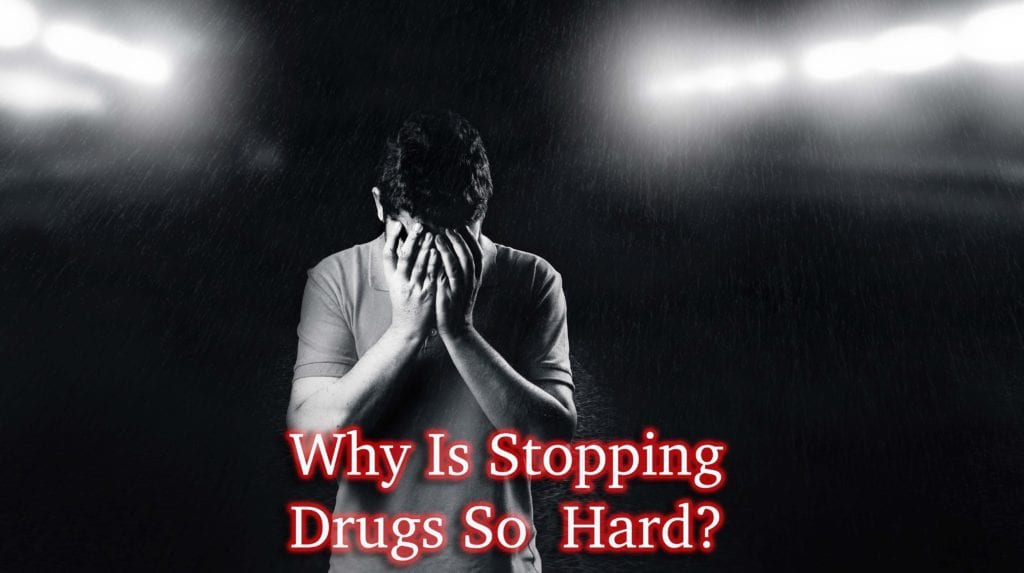
Addiction is a disease of the brain. Your brain is the control center of your body, affecting your thoughts, feelings, decisions and actions. Addiction to drugs or alcohol is hard because it changes the signals in your brain, which makes it difficult to feel okay without using the drugs. When you first take drugs you feel a high or a rush from the substance. But over time, the high is not as strong and you must take more and more of the drug to keep from feeling bad. This is what happens when you become addicted. Many people who are addicted want to quit and they think they can do it on their own. Stopping drug use is hard to do alone because the brain’s pleasure centers have been chemically changed over the course of the
addiction. There is no shame in asking someone for help in stopping drugs. In fact, most people simply cannot do it alone. The first step is to ask for help to overcome your addiction. Luckily, there are many great resources that are available today to help you stop using drugs.
Drug abuse is not a moral failing.
For the greater part of human history, alcohol and drug abuse has been viewed as a moral failing of the individual. It was easy to write off people’s bad behaviors as some sort of problem the individual chose to do. For many, it meant the addict was a bad person who simply wanted to make bad choices. Society has locked people up in jail, only to be forgotten and a negative stigma about addiction and drug abuse became pervasive in human culture. Only recently, science has learned more and more about the brain and the neurotransmitters that are affected through addiction. In reality the addiction is a shift in the wiring of the brain’s neural pathways

that leaves people seemingly helpless in overcoming their habit. It is these alterations in the brain that make stopping drugs so hard.
Traumatic experiences can lead to addictive behavior.
It is natural for the human brain to look for quick and easy solutions to our problems. Many people begin using drugs and alcohol because it makes these difficult feelings go away, even if only momentarily. While some people are able to “party” or experiment with drugs without developing an addiction, others who are dealing with unresolved mental issues can continue using to the point that they become addicts. This type of person will continue to use because it seemingly helps make their problems go away for a short period of time. Continued use of drugs will change how the brain deals with emotions and stress to the point that life can feel unbearable without them. This leads to further use which can rapidly turn into abuse and addiction.
Dopamine is a neurotransmitter that regulates mood and helps a person experience the feeling of reward. Most substances of abuse affect the absorption, production and pathways related to dopamine. Dopamine is released in many experience of life without drugs. Falling in love, playing with your pets, listening to good music, exercising or eating good food can all release dopamine, naturally. When a person uses drugs over a long period of time these natural pathways are disrupted and trained to only release dopamine when the drugs are used. This definitely makes it hard to stop using drugs because the brain forgets how to experience pleasure without the drugs. Many people are prone to relapse after they go through rehab for this reason. Addicts may miss being “high” when they first experience sobriety, but a lot have a hard time dealing with emotions that had been masked for so long while they were abusing drugs and alcohol.
Withdrawal symptoms can often be uncomfortable, even painful and unbearable for some recovering addicts.
When using drugs, the brain will adjust to the increase in dopamine and other neurochemicals by reducing normal production. For many people who abuse drugs or alcohol feeling normal is no longer being sober. Being high, or drunk is the new normal for them. When this is the case, a tolerance has been built up and many people will not even notice they are taking more and more of the substance to attain the feeling of normality. Once the tolerance is built up, quitting use can result in withdrawal symptoms. These can often be painful even excruciating to overcome, in some rare cases people have been known to die from their withdrawal symptoms.
For many people who are addicted and want to quit using drugs, the fear or very real physical pain associated with withdrawal compels them to continue their abuse. Avoiding potential withdrawal symptoms can be a strong motivator for addicts to keep abusing drugs, even when they want to stop using drugs. When your brain has been conditioned to use drugs to the point that they help you feel normal, quitting can seem impossible. Fortunately, curing addiction is not an impossible feat. It is quite difficult for most people, but sobriety is always within the realm of possibility.
Scientific research has dramatically changed the addiction treatment industry in recent years.
We have learned about the brain’s reward system and the potential underlying emotional and mental issues that contribute to substance abuse and addiction. This has led to a rapid advancement into drug rehabilitation techniques that go far beyond the failures of old approaches to viewing addiction as something only bad people do.
Medication assisted treatments have shown great potential in treating patients who have become addicted to opioids, like heroin or Oxycontin. Psychologists have learned more about cognitive behavioral therapy and how to teach the brain new ways to approach emotions or past traumatic experiences that may have led to the initial use of drugs.
Some modern advancements of addiction science have been focused on researching mindfulness mediation, magnetic stimulation of the brain and even vaccines that could prevent drugs from entering the brain. These techniques may be far away from becoming reality, but they do show the potential of emerging science.
If you or someone you care about is struggling with addiction, know that it is okay to ask for help. Simply asking for help could be the most important decision you make in your entire life. At 10 Acre Ranch, we strive to help people rebuild their lives. We can help you today. We are open 24/7 and are available to guide you in the right direction. All you have to do is call:






